There are numerous reasons behind the use of remote desktops, which play a crucial role in today’s IT software ecosystem. If you’re providing support services for desktops and laptops, working with virtual servers or applications, or working in a company in which the offices are distributed nationally or internationally, you’ll be using remote desktop software.
Windows systems come with a built-in protocol for remote connections. Microsoft Remote Desktop Protocol (RDP) provides a graphical interface through which users can connect to a remote computer via a network connection. However, there are now several RDP alternatives on the market, designed to address potential functionality gaps. My top recommendation for a remote desktop alternative is SolarWinds® Dameware®, offering an on-premises and a cloud version, both designed to facilitate the easy handling of remote desktop issues.
How to Choose an RDP Alternative
- SolarWinds Dameware Remote Support
- SolarWinds Dameware Remote Everywhere
- Royal TS
- Screens
- Terminals
- AnyDesk
- Chrome Remote Desktop
- BeyondTrust Remote Support
- RealVNC
- Citrix DaaS
- Parsec
What Is RDP?
RDP, short for Remote Desktop Protocol, is a protocol developed by Microsoft. It allows you to connect to another computer using a graphical user interface, so you can interact with the remote machine. You can control a remote desktop session and delete or copy text between applications running on the host machine and the guest machine. This helps with remote troubleshooting and issue resolution, so IT staff won’t need to go directly to the computer experiencing the problem.
However, with the rise of cybercrime have come warnings about the security of RDP. Moreover, several RDP alternatives have appeared on the market, many of which offer much more in the way of capabilities depending on your specific needs.
Limitations of RDP
While RDP is a great remote desktop connection solution, it has various shortcomings, including susceptibility to security vulnerabilities, a lack of remote reboot capability, and simultaneous remote access limitations.
Vulnerable to Security Attacks
RDP connections mostly take place at TCP port 3389 by default. Attackers make this port a target by exploiting its vulnerabilities. If the port is left exposed, attackers can gain control of the machine and install malware. Attackers can also intercept traffic from the RDP server and set up encryption.
Lacks Remote Reboot Options
When offering remote support, IT technicians may need to initiate a reboot of the remote machine and automatically reconnect it. Such features are not native to RDP.
A limited Number of Concurrent RDP Sessions Allowed
By default, you can only hold one concurrent remote session on Windows OS and a maximum of two on Windows Server OS. You need to install Remote Desktop Session Host (RDSH) and purchase RDS client access licenses (CALs) if you want more sessions.
How to Choose an RDP Alternative
With a wide range of RDP alternatives available, choosing the best can be challenging. In this guide, we’ve compiled a list of features to remember when choosing a remote protocol service. As a start, you should prioritize RDP services that offer comprehensive security, record audit trails, support unattended access, provide cross-platform support, and have low bandwidth usage requirements.
Security: Improperly secured remote desktop software can pose serious security threats. Ensure the protocol encrypts an entire session and employs MFA mechanisms like 2FA. A protocol should support at least 128-bit or 256-bit encryption.
Cross-platform support: Ensure that the protocol is compatible with multiple operating systems, including Linux, Windows, macOS, and mobile platforms (iOS, Android). It’s a plus if it can support remote connections between mobile and desktop users.
Bandwidth usage: Low bandwidth may affect remote access performance. If you have sluggish internet speeds, you should use protocols optimized for low bandwidth usage.
Audit log: Monitoring and logging user activities, including login attempts, file access, and system changes, is essential for maintaining a secure remote environment.
Unattended access: Look for solutions that allow authorized users to connect to remote systems without requiring someone on the other end to accept the connection manually. They should also maintain session persistence even after a remote user logs out.
11 Best Remote Desktop Alternatives
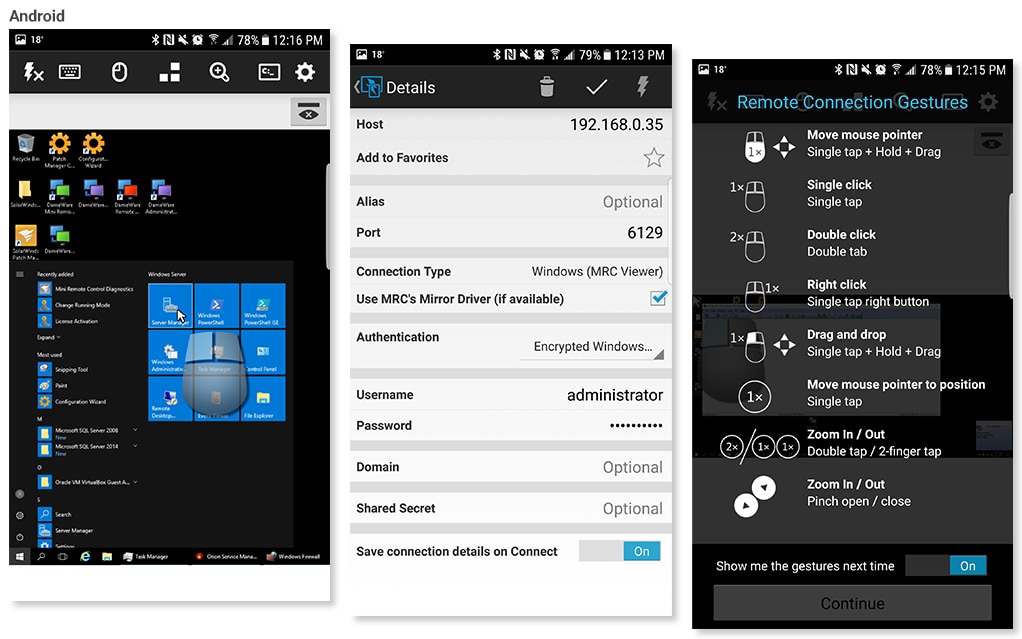
Dameware Remote Support is a significant upgrade from RDP, designed to provide all of the same features as the Microsoft protocol along with added features that help enhance problem resolution and cybersecurity on remote devices. Like RDP, DRS makes it easy to connect remotely to other computers. With additional features built to go beyond those in RDP, DRS makes for a comprehensive and easy-to-use remote desktop connection manager alternative.
Like RDP, DRS offers multi-platform remote access, with support for Mac, Windows, and Linux computers. In an enterprise setting, for example, it can work across your Windows desktops, Linux servers, and Mac devices staff may connect with from home. That includes providing access to computers from Android and Apple devices including tablets, which are not supported in RDP.
Both RDP and DRS offer the ability to connect over both the internet and LAN. This is particularly important in DRS since this, along with the tool’s other features, can help facilitate straightforward troubleshooting. With both DRS and RDP, you can remotely reboot entire systems or stop services and processes if something is causing the system to fail. DRS is designed to go beyond that, though—it includes system tools that allow you to fix problems on a computer you’re connected to remotely without having to interrupt the user’s session. DRS, like RDP, also lets you directly copy and paste—or delete—text in applications between the host and guest machine.
Dameware Remote Support offers a free trial for up to 14 days.
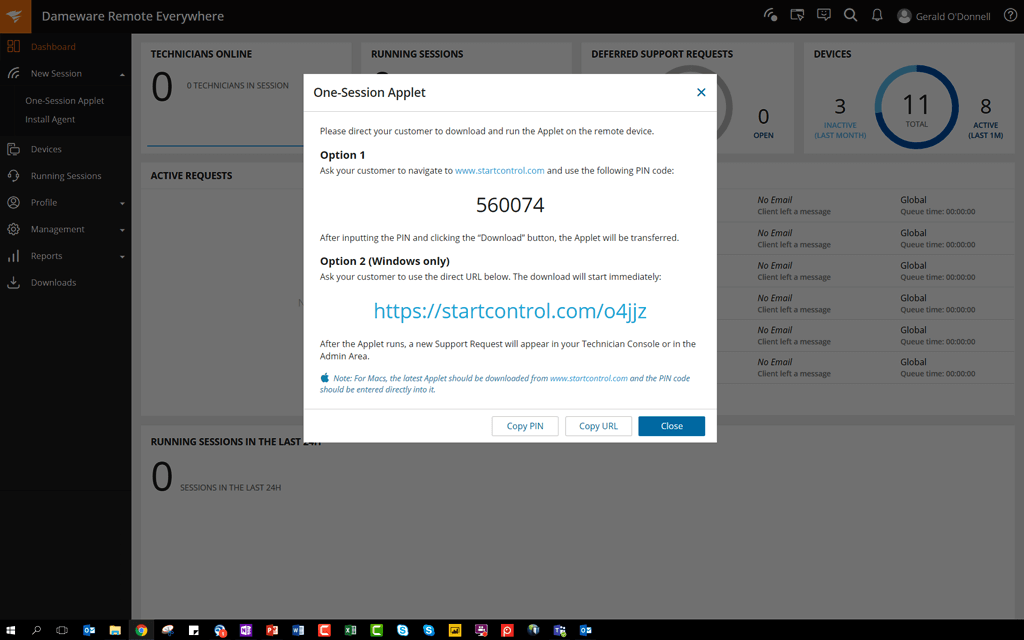
Another good option to consider, particularly if you are working in a cloud-based IT environment, is Dameware Remote Everywhere. DRE is in some ways the same tool as DRS, but it offers slightly different features.
First, DRE is designed for use in the cloud, which means it is accessible from any compatible device with internet connection. RDP also connects to remote devices over the internet; however, a distinction between the two tools may arise when it comes to speed. While DRE has a particular focus on speed, with remote connections typically established within eight seconds, RDP typically has slower connection times.
DRE also includes additional features for taking screenshots and recording during remote sessions and connecting with the user through VoIP or video call. RDP doesn’t natively include these features, with the only way to record or take screenshots during remote sessions is by implementing outside tools and procedures.
Dameware Remote Everywhere offers a free trial for 14 days.
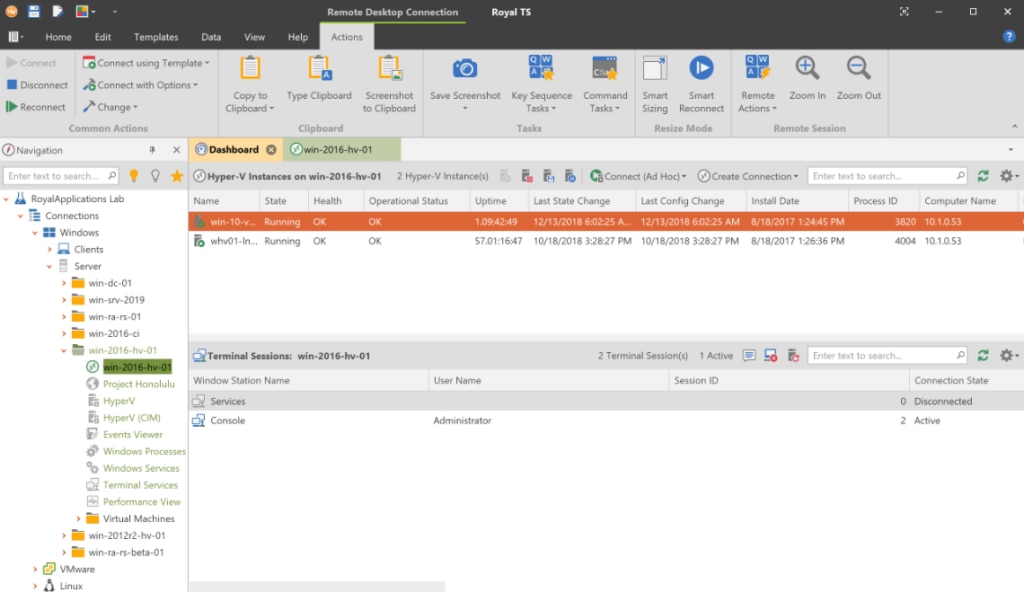
Royal TS provides support for RDP and other connection protocols, including VNC, SSH, FTP and SFTP, and connection through web-based interfaces. Like other professional tools, it includes credentials management and sharing features, so you don’t need to log in repeatedly. It also provides remote troubleshooting capabilities.
One of the unique features of Royal TS is it can create command tasks and key sequence tasks, which allow you to create your own tasks and automate parts of your troubleshooting processes. For example, ping and traceroute are built in, and you can automate repetitive tasks, so you can execute them as soon as a connection is established.
Royal TS distinguishes itself from RDP when it comes to credential allocation. While RDP lets you save and share credentials between teammates, it does not let you save credentials tied to a remote desktop gateway. Not only does Royal TS let you create objects and folders and dynamically allocate credentials, it also lets you link folders and connections to inherit credentials. These features are designed to facilitate strong access and security measures.
Royal TS offers a free download of its “Lite” version, which allows up to 10 connections and 10 credentials. The paid version is also available through the developer’s website.
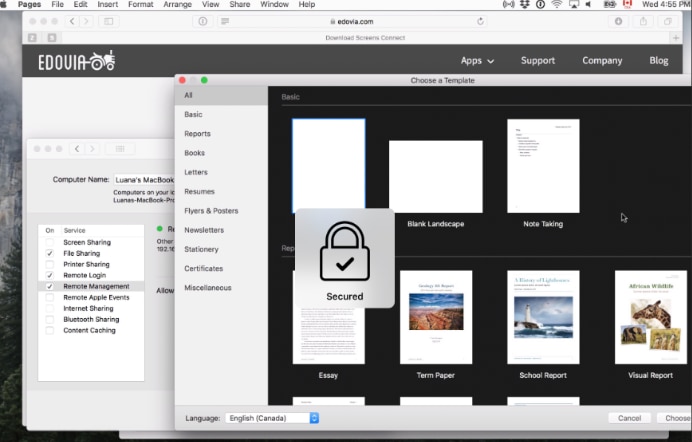
If you’re looking for an RDP alternative specifically for use with Mac computers or mobile devices, Edovia produces many products, including several versions of Screens.
Screens iOS allows you to control other computers from your iPhone or iPad, using an SSH connection. It can connect to Mac, Linux, Raspberry Pi, and Windows PCs, using the Screens Connect app. You can view the current session (e.g., for troubleshooting), or start a new session.
Screens Mac provides the same capabilities as Screens iOS, but from Mac OS systems.
There is a free trial of Screens Mac, and a free version, called Screens Express, with limited usage for specific circumstances. Screens Mac is downloadable through the Edovia website. You can buy Screens iOS from the App Store.
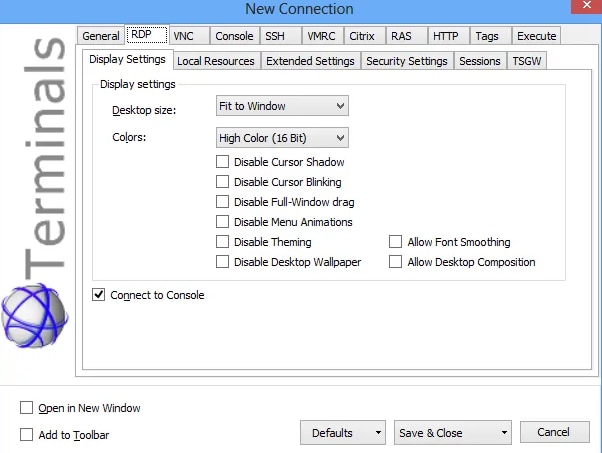
Terminals is an open-source remote desktop manager intended to manage the problem of controlling multiple connections simultaneously. It integrates RDP as one of the protocols it supports, but also works with VNC, VMRC, SSH, Telnet, RAS, Citrix ICA, and HTTP and HTTPs.
It includes several basic features to make the remote connection experience smoother, including a multi-tab interface, resizable windows, customizable toolbars, and a connections history, so you can see which machines you have connected to recently. You can also search by server name and look at protocol notes. This tool is high-quality, but basic, and it may not be suitable for a large enterprise needing a greater set of features for IT support and troubleshooting management.
You can download Terminals for free on Github.
As a free tool, Terminals is a mRemoteNG alternative. For a comparison of mRemoteNG vs. Terminals, look at both repositories in Github to view the documentation, as it gets a little technical.
6. AnyDesk
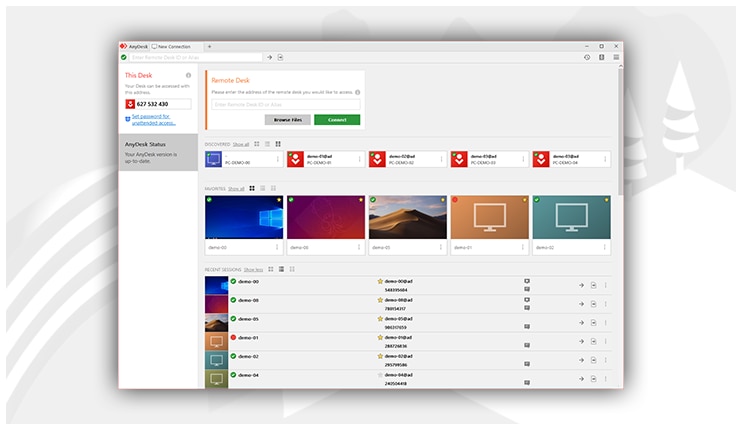
AnyDesk offers low-latency, high-bandwidth remote access to desktops within a network. When connected to a remote device, you can take control of input devices like keyboard and mouse, manage files, print remotely, and manage mobile devices.
Key Features
- With the remote printing feature, you can print a file stored on a remote device on a local printer or print a file located on a local device on a remote printer. You can disable remote printing in the Custom Client Generator anytime.
- You do not need to install AnyDesk to use it; you can use it as portable software.
- It works on Windows, Linux, macOS, FreeBSD, iOS, Android, Raspberry Pi, and Chrome OS.
- You can record sessions via the session recording feature.
- It has a chat functionality feature allowing real-time exchange of messages during a session.
- Its multi-session support allows you to control multiple PCs simultaneously. In addition, unattended access allows you to take control of a remote computer even if no one is using the remote computer.
Limitation
- You may experience lag and performance issues if using low-resolution devices.
7. TeamViewer
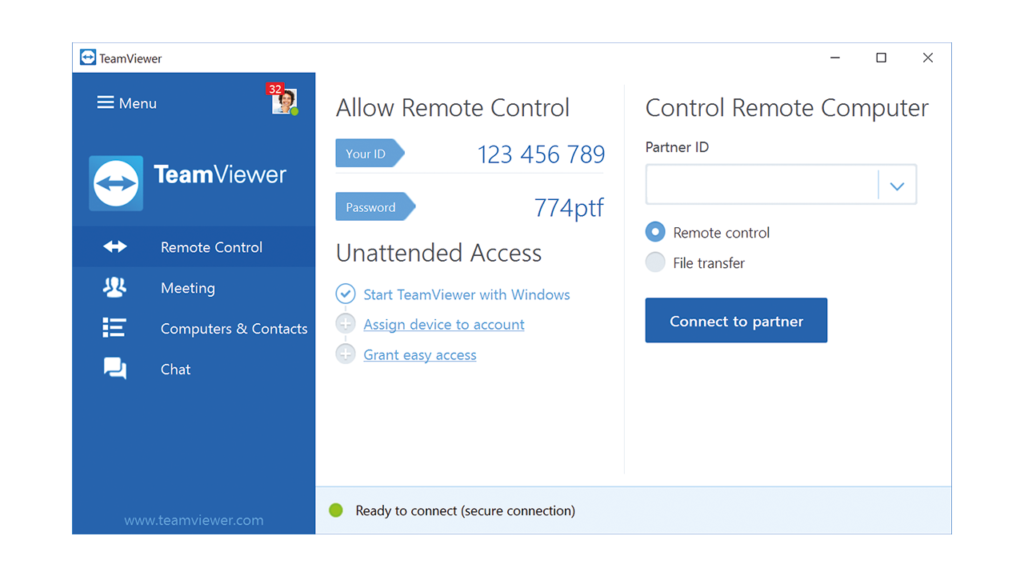
TeamViewer comes with a portable version and a quick support module, which you only need to run (not install) to start a remote control session.
Key Features
- This RDP replacement provides a unique remote ID for every device and generates a temporary random password to allow you to connect to a remote computer.
- For file transfer with TeamViewer, you have a drag-and-drop functionality that allows you to transfer files from a host computer’s OneDrive, Google Drive, or Dropbox to a remote computer or vice versa.
- It allows both video and audio sharing.
- Technicians can use the group chat capability to brainstorm by texting and chatting. It has an integrated live chat software.
- You can set up unattended access.
- With the mobile functionality, you can connect to desktops from your mobile device or connect to a mobile device from a desktop.
- It supports Linux, macOS, and Windows platforms. TeamViewer provides remote access to IoT devices and supports Raspberry Pi and Chrome OS.
- It has Servicecamp, an integrated ticket management feature that allows you to efficiently sort tickets and prioritize queries for proactive and fast handling of IT service requests.
- Multi-user support sessions allow multiple users to remote control a single device at one time.
- Sessions are end-to-end encrypted using AES 256 and RSA cryptography. Access to sessions is by 2FA using a time-based one-time password (TOTP).
Limitation
- The quality and stability of TeamViewer connections become a pain point when there’s a slow internet connection.
- It can get expensive
8. Chrome Remote Desktop
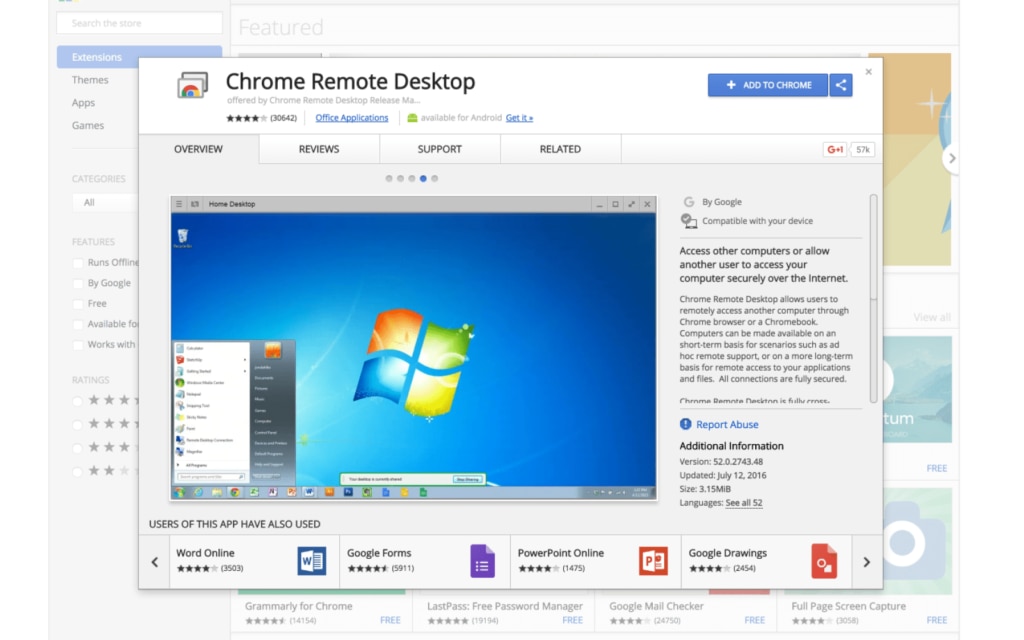
Chrome Remote Desktop is a free RDP alternative by Google that provides access to a remote computer from the Chrome browser.
Key Features
- It has cross-platform compatibility. It can work for macOS, Chrome OS, Windows, Raspberry Pi, Linux systems, Android, and iOS.
- If you need persistent access to a host computer, CRD provides a remote access feature. You need to install Chrome Remote Desktop on both the host and remote device and log in to both computers to the same Google account. However, if you want one-off access to a remote computer, CRD provides remote support. You only need to install CRD software on the host PC and connect to the remote computer using a one-off access code.
- You can download or upload files between the two remotely connected computer systems.
- Remote sessions are encrypted only through HTTPS.
Limitations
- It doesn’t provide audio or video sharing support, remote printing, multiple sessions, or real-time chat.
- It runs only through Chrome browsers, and you need a Google account.
9. BeyondTrust Remote Support
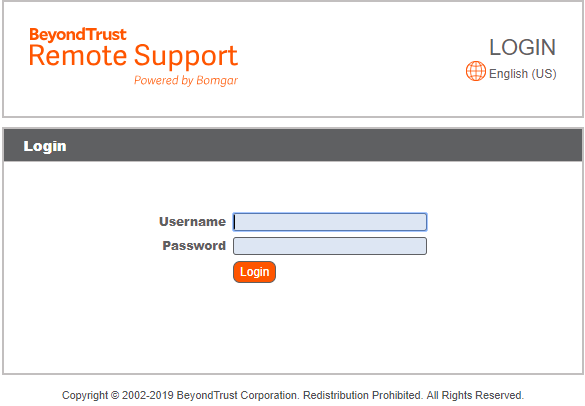
BeyondTrust Remote Support provides IT admins and service desk teams with a single, secure solution to resolve technology and support challenges for any device inside or outside their network.
Key Features
- It supports Windows, macOS, iOS, Linux, Chrome OS, and Android platforms.
- It offers native 2FA support through BeyondTrust Verify. User identity is verified using TOTP before a session starts.
- Technicians, end users, and endpoints connect through outbound connections. Firewall changes and port forwarding are not required, as with RDP.
- It allows you to manage unattended access to any device or system.
- Record session activity, monitor activity in real-time, and generate audit logs without interfering with service desk processes.
- It offers mobile support and works across multiple devices, including iOS, tablets, and Android smartphones.
- It supports screen sharing and real-time chat.
- It integrates with ITSM, security information and event management (SIEM), and customer relationship management (CRM) tools.
Limitation
- The servers are slow to load.
10. RealVNC
RealVNC Connect is a remote desktop alternative that offers a flexible licensing model with options for server-based licensing (pay per remote computer) and viewer-based licensing (pay per technician).
Key Features
- It connects a user to a remote computer by sharing its mouse, keyboard, and screen, allowing multiple users connected to the same server to share the same keyboard and screen.
- It supports platforms like macOS, Windows, Raspberry Pi, and Linux. It works on mobile devices such as tablets and smartphones.
- Remote sessions are secured by default using a minimum of 128-bit AES-GCM encryption for professional subscription and up to 256-bit AES-GCM for enterprise users.
- To establish a cloud connection, you sign in to their RealVNC account and then authenticate again to the VNC Server app on the remote computer using Active Directory or system credentials.
- An enterprise subscription allows you to enable 2FA on both the RealVNC account and VNC Server.
Limitation
- It requires a strong network connection to run smoothly, and the applications are heavy, requiring high bandwidth.
11. Citrix DaaS
Citrix Desktop as a Service (DaaS) is a hybrid cloud-based virtualization service used to deliver virtual apps and desktops. With Citrix DaaS, you can remotely monitor applications installed on another computer from your local computer.
Key Features
- Citrix supports the deployment of Citrix Virtual Apps and Desktops on various public cloud and on-prem hypervisors. These include Google Cloud, Amazon (AWS), Microsoft Azure, and hypervisors such as Citrix Hypervisor, Microsoft Hyper-V, and VMware vSphere.
- Because it’s built on top of Citrix Independent Computing Architecture (ICA) remoting protocol, Citrix DaaS has low bandwidth requirements. This lets you share virtual applications and desktops over a slow internet connection.
- You can define to use authentication methods such as Active Directory, Okta, Citrix Gateway, and SAML 2.0.
- Citrix’s session reliability and auto-client reconnection features allow you to reconnect automatically to a remote session after recovering from a network disruption.
Limitation
- It can take time to establish a connection between the local computer and the virtual computer.
12. Parsec
Optimized for gamers, Parsec allows you to connect to a remote computer connected to your Parsec account from a host computer and take control of its gamepad, mouse, keyboard, and non-gaming applications.
Key Features
- It supports a frame rate of up to 60 frames per second (FPS) in UHD resolution at low latency, while some remote access software, such as Microsoft’s, supports a maximum of 30 FPS.
- It’s available for macOS, Windows, Linux, web, and Android platforms.
- Logging in to Parsec requires multifactor authentication (MFA) through the IP address or an application.
- Remote sessions are secured from third parties using Datagram Transport Layer Security (DTLS) and SHA-256 encryptions.
- It supports real-time chat, and its multi-user support capability allows more than one user to connect to the host machine simultaneously.
Limitation
- It lacks native high dynamic range (HDR) support, a setback for performing projects that rely heavily on HDR content.
- It’s optimized for newer graphics cards.
Conclusion
There are several factors behind choosing a good RDP alternative, but your decision will in large part depend on the number of connections you’re dealing with, the type of information in your environment (e.g., if it’s sensitive and needs extra security), and the size of your enterprise.
A free or open-source tool might be suitable in a low-risk, small business environment, in which case Terminals is a good choice. For a large enterprise or a company with sensitive data, invest in a professional tool such as Dameware Remote Support or Dameware Remote Everywhere.


